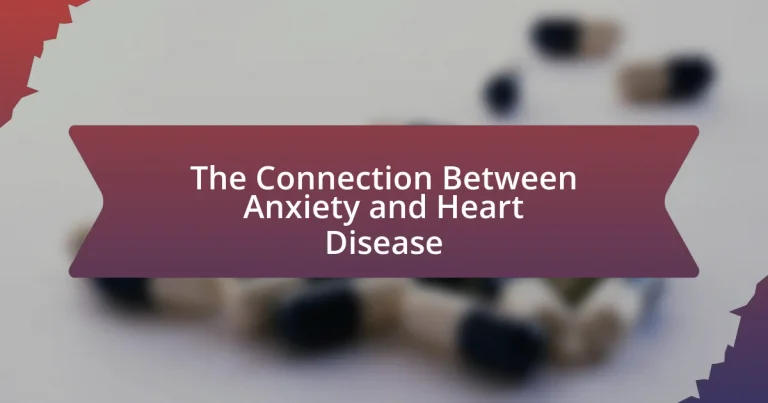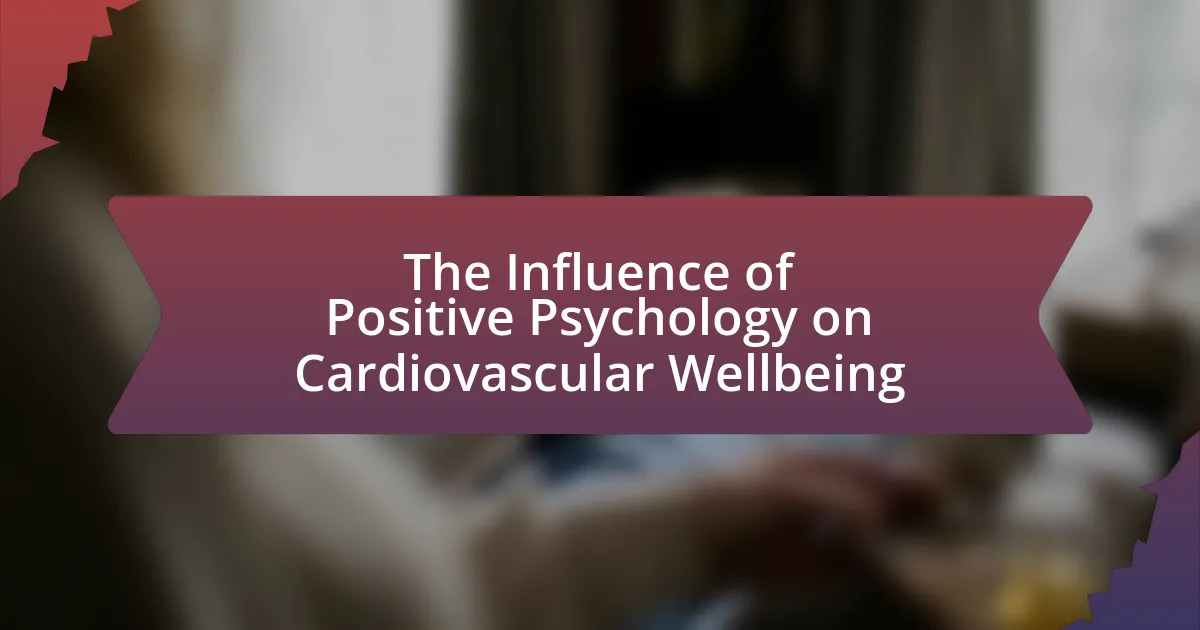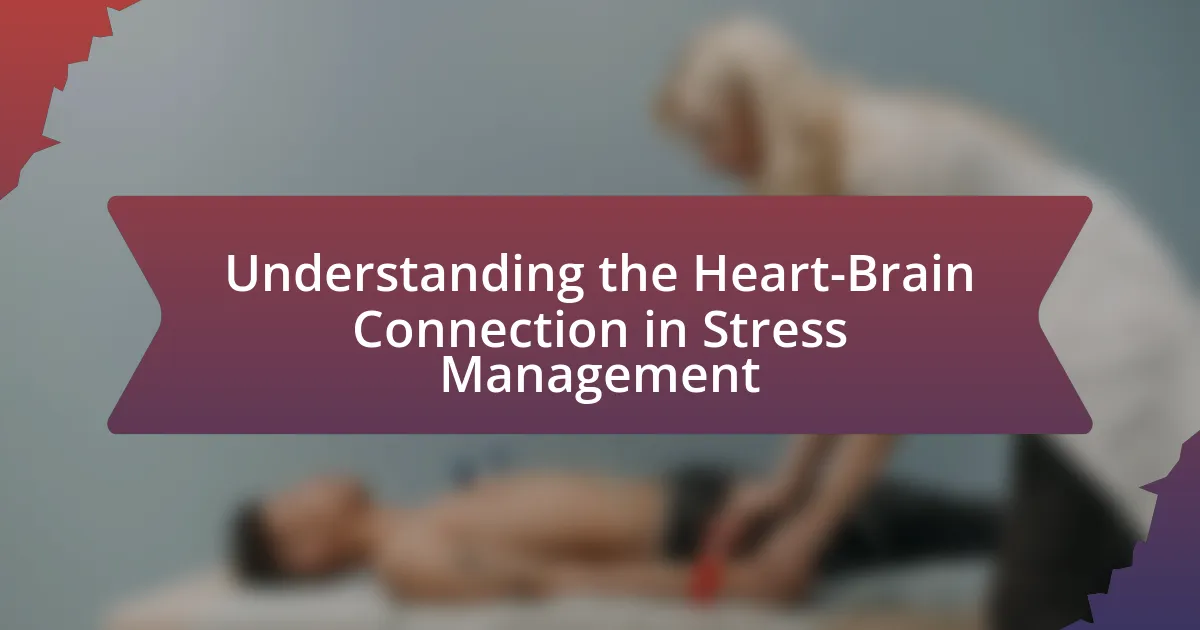The article examines the significant connection between anxiety and heart disease, highlighting how chronic anxiety can elevate stress hormones, leading to increased heart rate, blood pressure, and inflammation, which are risk factors for cardiovascular conditions. Research indicates that individuals with anxiety disorders are 1.5 to 2 times more likely to develop heart disease, with a 26% increased risk of coronary heart disease. The article discusses the physiological changes caused by anxiety, common symptoms that overlap with heart disease, and the importance of managing anxiety through lifestyle changes and therapeutic approaches to improve overall heart health. Additionally, it emphasizes the need for integrated care that addresses both mental and cardiovascular health to enhance patient outcomes.
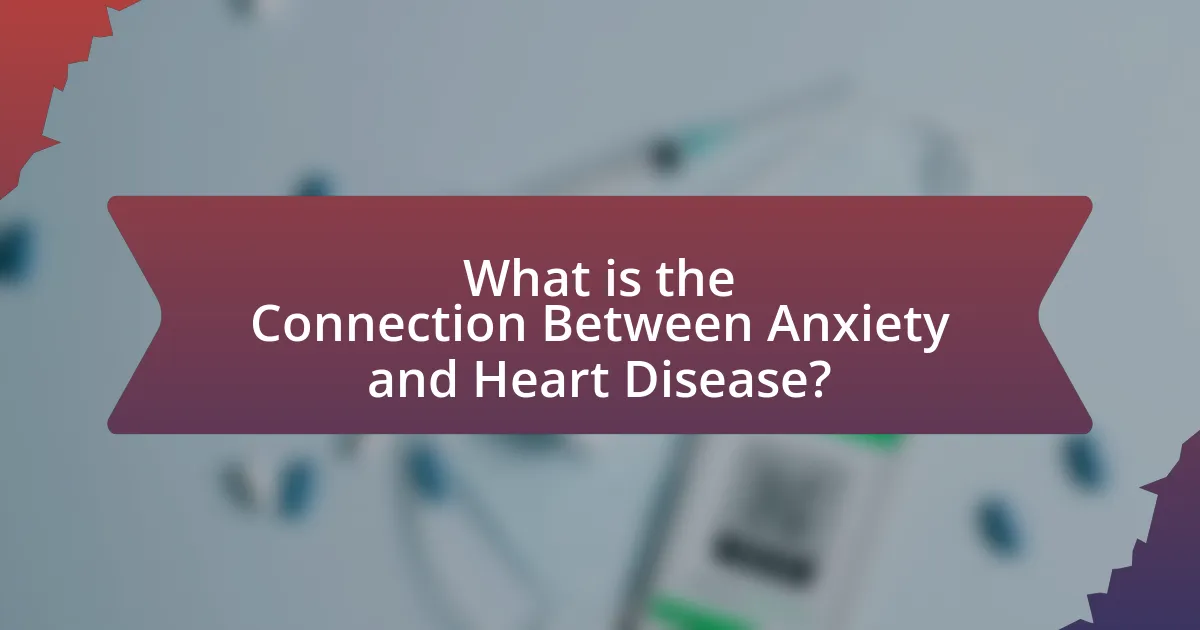
What is the Connection Between Anxiety and Heart Disease?
Anxiety is linked to an increased risk of heart disease due to its impact on the body’s stress response and cardiovascular health. Chronic anxiety can lead to elevated levels of stress hormones, such as cortisol, which may contribute to inflammation, high blood pressure, and other cardiovascular risk factors. Research indicates that individuals with anxiety disorders have a higher prevalence of heart disease, with studies showing that anxiety can double the risk of heart attack and increase the likelihood of developing coronary artery disease. For instance, a meta-analysis published in the Journal of the American College of Cardiology found that anxiety is associated with a 26% increased risk of coronary heart disease.
How does anxiety impact heart health?
Anxiety negatively impacts heart health by increasing heart rate and blood pressure, which can lead to cardiovascular problems. Chronic anxiety triggers the body’s stress response, releasing hormones like cortisol and adrenaline that elevate heart activity. Studies indicate that individuals with anxiety disorders have a higher risk of developing heart disease; for instance, research published in the Journal of the American College of Cardiology found that anxiety is associated with a 26% increased risk of coronary heart disease. This connection underscores the importance of managing anxiety to protect heart health.
What physiological changes occur in the body due to anxiety?
Anxiety triggers several physiological changes in the body, primarily involving the autonomic nervous system. These changes include increased heart rate, elevated blood pressure, and heightened levels of stress hormones such as cortisol and adrenaline. Research indicates that chronic anxiety can lead to persistent inflammation and alterations in immune function, which may contribute to cardiovascular issues. For instance, a study published in the Journal of the American College of Cardiology found that individuals with anxiety disorders have a higher risk of developing heart disease due to these physiological responses.
How does chronic anxiety contribute to heart disease risk?
Chronic anxiety significantly increases the risk of heart disease by elevating stress hormones, which can lead to inflammation and arterial damage. Prolonged anxiety triggers the release of cortisol and adrenaline, resulting in increased heart rate and blood pressure. Research indicates that individuals with chronic anxiety are 1.5 to 2 times more likely to develop cardiovascular diseases compared to those without anxiety disorders. Additionally, anxiety can lead to unhealthy coping mechanisms, such as poor diet and lack of exercise, further exacerbating heart disease risk.
What are the common symptoms linking anxiety and heart disease?
Common symptoms linking anxiety and heart disease include chest pain, palpitations, shortness of breath, and fatigue. These symptoms arise because anxiety can trigger the body’s stress response, leading to increased heart rate and blood pressure, which may exacerbate existing heart conditions. Research indicates that individuals with anxiety disorders are at a higher risk for developing cardiovascular diseases, as evidenced by a study published in the Journal of the American College of Cardiology, which found that anxiety is associated with a 26% increased risk of coronary heart disease.
How can anxiety mimic heart disease symptoms?
Anxiety can mimic heart disease symptoms through physiological responses such as increased heart rate, chest pain, and shortness of breath. These symptoms arise due to the body’s fight-or-flight response, which triggers the release of stress hormones like adrenaline, leading to heightened cardiovascular activity. Research indicates that individuals with anxiety disorders often report similar symptoms to those experienced during a heart attack, including palpitations and tightness in the chest. A study published in the Journal of the American College of Cardiology found that anxiety can significantly increase the perception of chest pain, further complicating the diagnosis of heart conditions.
What specific symptoms should individuals be aware of?
Individuals should be aware of symptoms such as chest pain, shortness of breath, rapid heartbeat, and excessive sweating, as these can indicate anxiety and may also be linked to heart disease. Research shows that anxiety can manifest physically, leading to symptoms that mimic heart conditions. For instance, a study published in the Journal of the American College of Cardiology found that individuals with anxiety disorders are at a higher risk for developing cardiovascular diseases, highlighting the importance of recognizing these symptoms early.
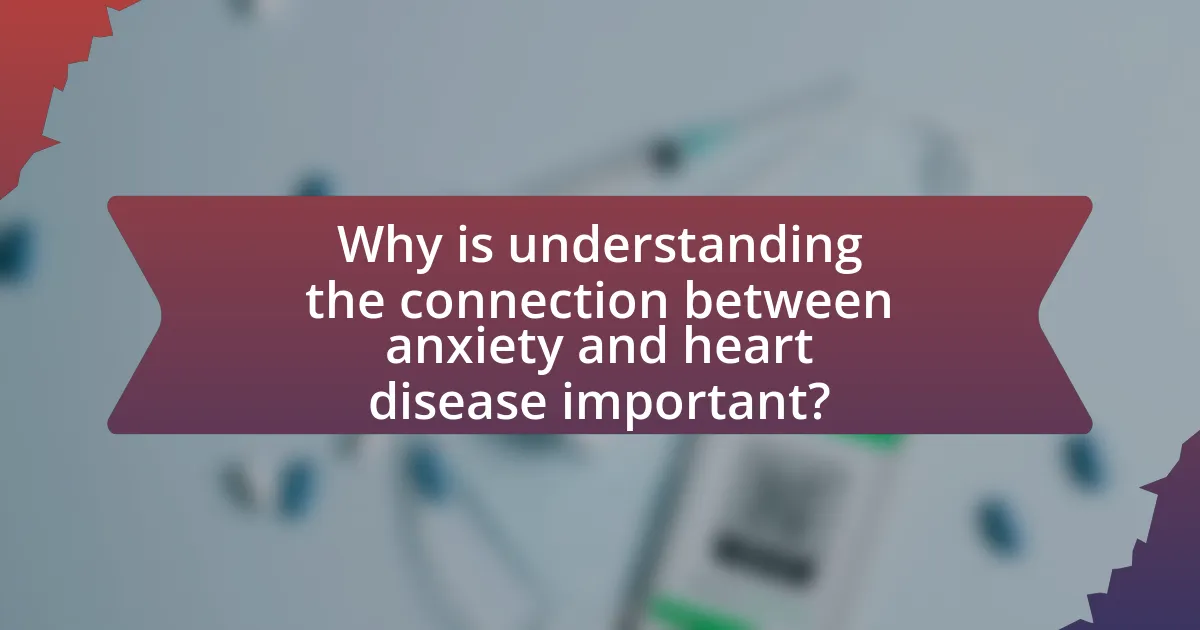
Why is understanding the connection between anxiety and heart disease important?
Understanding the connection between anxiety and heart disease is important because anxiety can significantly increase the risk of developing cardiovascular conditions. Research indicates that individuals with anxiety disorders are 1.5 to 2 times more likely to experience heart disease compared to those without anxiety. This heightened risk is attributed to factors such as increased heart rate, elevated blood pressure, and unhealthy coping mechanisms like smoking or poor diet, which are often exacerbated by anxiety. Recognizing this connection allows for better prevention strategies and treatment plans that address both mental health and cardiovascular health, ultimately improving patient outcomes.
What role does mental health play in cardiovascular health?
Mental health significantly influences cardiovascular health, as psychological stress and anxiety can lead to physiological changes that increase the risk of heart disease. Research indicates that individuals with anxiety disorders are at a higher risk for developing cardiovascular conditions, with studies showing that anxiety can elevate heart rate, blood pressure, and inflammation, all of which are risk factors for heart disease. For instance, a meta-analysis published in the Journal of the American College of Cardiology found that anxiety is associated with a 26% increased risk of coronary heart disease and a 48% increased risk of cardiovascular events. This evidence underscores the critical link between mental health and cardiovascular well-being.
How can anxiety disorders affect overall health outcomes?
Anxiety disorders can significantly impair overall health outcomes by increasing the risk of cardiovascular diseases and other physical health issues. Research indicates that individuals with anxiety disorders are more likely to experience elevated heart rates, hypertension, and other stress-related conditions, which can lead to heart disease. A study published in the Journal of the American College of Cardiology found that anxiety is associated with a 26% increased risk of coronary heart disease. Furthermore, anxiety can lead to unhealthy coping mechanisms, such as poor diet and lack of exercise, further exacerbating health risks.
What are the implications for treatment and prevention?
The implications for treatment and prevention of the connection between anxiety and heart disease include the need for integrated care approaches that address both mental and cardiovascular health. Research indicates that individuals with anxiety disorders are at a higher risk for developing heart disease, necessitating early intervention strategies that incorporate psychological support alongside traditional cardiovascular treatments. For instance, a study published in the Journal of the American College of Cardiology found that patients with anxiety had a 26% increased risk of coronary artery disease, highlighting the importance of screening for anxiety in cardiac patients. Effective treatment may involve cognitive-behavioral therapy, medication for anxiety, and lifestyle modifications, which can collectively reduce the risk of heart disease and improve overall health outcomes.
How prevalent is the connection between anxiety and heart disease?
The connection between anxiety and heart disease is highly prevalent, with studies indicating that individuals with anxiety disorders have a significantly increased risk of developing cardiovascular diseases. Research published in the Journal of the American College of Cardiology found that anxiety can lead to increased heart rate, elevated blood pressure, and inflammation, all of which are risk factors for heart disease. Additionally, a meta-analysis in the journal Psychosomatic Medicine reported that anxiety is associated with a 26% increased risk of coronary heart disease. These findings underscore the importance of addressing anxiety as a critical factor in cardiovascular health.
What statistics highlight the relationship between anxiety and heart disease?
Anxiety significantly increases the risk of heart disease, with studies indicating that individuals with anxiety disorders have a 1.5 to 2 times higher likelihood of developing cardiovascular diseases compared to those without anxiety. Research published in the Journal of the American College of Cardiology found that anxiety is associated with a 26% increased risk of coronary heart disease and a 48% increased risk of heart attack. Furthermore, a meta-analysis in the European Journal of Preventive Cardiology revealed that anxiety is linked to a 30% higher risk of stroke. These statistics underscore the critical connection between anxiety and heart disease, highlighting the need for integrated mental and physical health care.
How do different demographics experience this connection?
Different demographics experience the connection between anxiety and heart disease in varied ways, influenced by factors such as age, gender, and socioeconomic status. For instance, studies indicate that younger adults may exhibit higher anxiety levels, which can lead to increased heart disease risk, while older adults often experience anxiety differently, potentially due to chronic health conditions. Gender differences also play a role; women are more likely to report anxiety symptoms and have a higher prevalence of anxiety disorders, which correlates with a greater risk of heart disease compared to men. Additionally, individuals from lower socioeconomic backgrounds may face higher stress levels and limited access to healthcare, exacerbating both anxiety and heart disease risks. Research published in the Journal of the American College of Cardiology highlights these demographic disparities, emphasizing the need for tailored interventions to address the unique experiences of different groups.
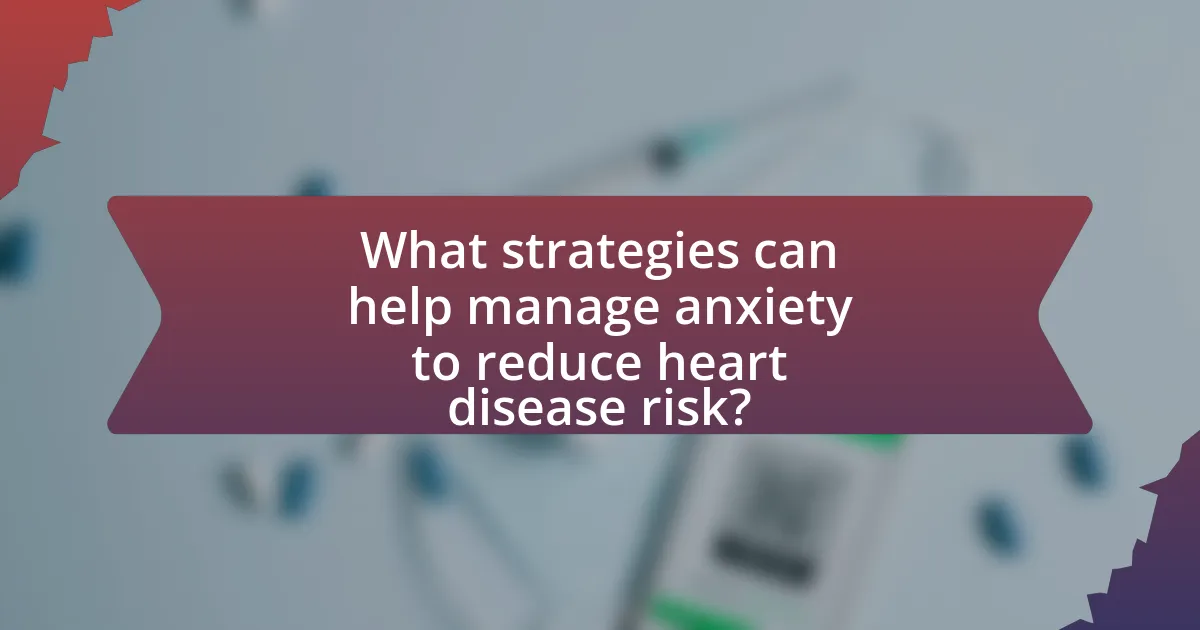
What strategies can help manage anxiety to reduce heart disease risk?
Cognitive-behavioral therapy (CBT) is an effective strategy for managing anxiety, which can subsequently reduce the risk of heart disease. CBT helps individuals identify and change negative thought patterns and behaviors that contribute to anxiety, leading to improved emotional regulation and reduced physiological stress responses. Research indicates that individuals who engage in CBT experience lower levels of anxiety and stress, which are significant risk factors for heart disease. A study published in the Journal of the American College of Cardiology found that patients with anxiety who participated in CBT showed a 50% reduction in anxiety symptoms and a corresponding decrease in heart disease risk markers.
What lifestyle changes can mitigate anxiety’s impact on heart health?
Regular physical activity, a balanced diet, adequate sleep, and stress management techniques can mitigate anxiety’s impact on heart health. Engaging in at least 150 minutes of moderate aerobic exercise weekly can lower anxiety levels and improve cardiovascular health by enhancing blood circulation and reducing stress hormones. A diet rich in fruits, vegetables, whole grains, and lean proteins supports heart health and can positively influence mood and anxiety levels. Prioritizing 7-9 hours of quality sleep each night is essential, as sleep deprivation can exacerbate anxiety and negatively affect heart function. Additionally, practicing mindfulness, meditation, or yoga can effectively reduce anxiety and lower blood pressure, contributing to better heart health. Studies indicate that these lifestyle changes can significantly decrease the risk of heart disease associated with anxiety disorders.
How can exercise influence both anxiety and heart health?
Exercise can significantly reduce anxiety and improve heart health by promoting the release of endorphins and enhancing cardiovascular function. Engaging in regular physical activity lowers levels of stress hormones, such as cortisol, which are linked to anxiety. Additionally, exercise strengthens the heart muscle, improves circulation, and lowers blood pressure, contributing to overall cardiovascular health. Research indicates that individuals who engage in moderate-intensity exercise for at least 150 minutes per week experience lower anxiety levels and a reduced risk of heart disease, as noted in a study published in the Journal of Clinical Psychiatry by Blumenthal et al. (2012).
What dietary adjustments can support mental and cardiovascular health?
Dietary adjustments that can support mental and cardiovascular health include increasing the intake of omega-3 fatty acids, fruits, vegetables, whole grains, and nuts while reducing saturated fats, trans fats, and added sugars. Omega-3 fatty acids, found in fish like salmon and walnuts, have been shown to improve mood and reduce anxiety, which is linked to heart health. A diet rich in fruits and vegetables provides essential vitamins and antioxidants that combat oxidative stress, a factor in both mental health disorders and cardiovascular diseases. Whole grains and nuts contribute to better heart health by improving cholesterol levels and reducing inflammation. Studies indicate that diets such as the Mediterranean diet, which emphasizes these foods, are associated with lower rates of depression and heart disease, reinforcing the connection between dietary choices and overall health outcomes.
What therapeutic approaches are effective for managing anxiety?
Cognitive Behavioral Therapy (CBT) is an effective therapeutic approach for managing anxiety. CBT focuses on identifying and changing negative thought patterns and behaviors that contribute to anxiety. Research indicates that CBT can significantly reduce anxiety symptoms, with studies showing that approximately 60-80% of individuals experience improvement after completing a course of CBT. Additionally, mindfulness-based therapies, such as Mindfulness-Based Stress Reduction (MBSR), have also been shown to effectively reduce anxiety levels by promoting present-moment awareness and acceptance. Evidence from clinical trials supports the efficacy of these approaches, demonstrating their ability to enhance coping strategies and improve overall mental health.
How does cognitive-behavioral therapy help in reducing anxiety symptoms?
Cognitive-behavioral therapy (CBT) helps reduce anxiety symptoms by identifying and changing negative thought patterns and behaviors that contribute to anxiety. CBT equips individuals with coping strategies and problem-solving skills, enabling them to manage anxiety more effectively. Research indicates that CBT can lead to significant reductions in anxiety symptoms, with studies showing that approximately 60-80% of individuals experience improvement after completing a CBT program. This evidence supports the efficacy of CBT in treating anxiety disorders, making it a widely recommended therapeutic approach.
What role do medications play in managing anxiety and heart disease risk?
Medications play a crucial role in managing anxiety, which can subsequently reduce the risk of heart disease. Anxiety disorders can lead to increased heart rate, elevated blood pressure, and other cardiovascular issues, making effective treatment essential. Antidepressants, particularly selective serotonin reuptake inhibitors (SSRIs), and anti-anxiety medications, such as benzodiazepines, have been shown to alleviate anxiety symptoms and improve overall heart health. For instance, a study published in the Journal of the American College of Cardiology found that patients with anxiety who received appropriate pharmacological treatment exhibited lower rates of cardiovascular events compared to those who did not receive treatment. This evidence underscores the importance of medications in mitigating the interplay between anxiety and heart disease risk.
What practical tips can individuals implement to improve their mental and heart health?
To improve mental and heart health, individuals should engage in regular physical activity, maintain a balanced diet, practice mindfulness or meditation, and ensure adequate sleep. Regular physical activity, such as 150 minutes of moderate aerobic exercise weekly, has been shown to reduce anxiety and improve cardiovascular health. A balanced diet rich in fruits, vegetables, whole grains, and lean proteins supports both mental well-being and heart health by reducing inflammation and improving mood. Mindfulness practices, including meditation, have been linked to lower stress levels and improved emotional regulation, which can positively impact heart health. Additionally, getting 7-9 hours of quality sleep per night is crucial, as sleep deprivation is associated with increased anxiety and higher risks of heart disease.
